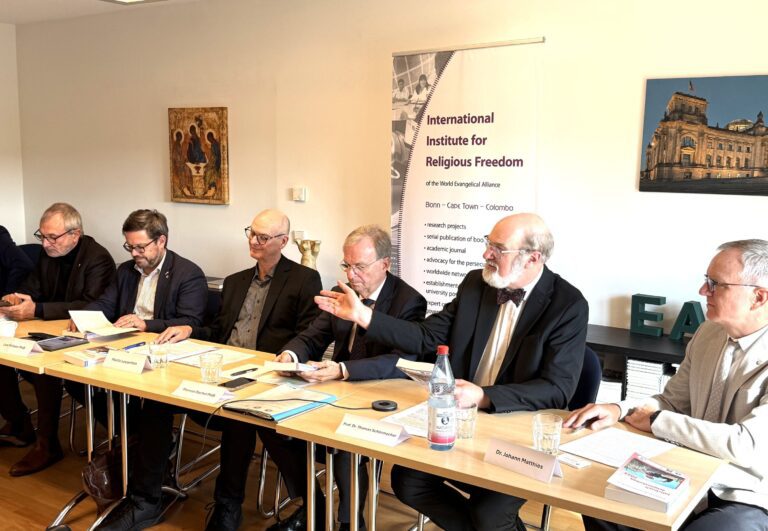Human rights experts in Berlin, Germany, said on Wednesday (October 15) that persecution of Christians around the world has increased significantly in both quantity and intensity.
Thomas Schirmacher, president of the International Society for Human Rights (ISHR), said at a press conference announcing the publication of ISHR’s 2025 yearbook “Freedom of Religion” and “Persecution and Discrimination of Christians” that the situation for Christians in many parts of the world has deteriorated significantly.
“This takes the form not only of direct violence (murder, kidnapping), but also legislation, social discrimination, restrictions on public and private life, control of churches and religious events,” Schirmacher said at the German Evangelical Union/Evangelical Union Allianz office in Berlin. “The rise of authoritarian regimes, religious nationalism, political instability, and violent conflict are increasing pressures for persecution.”
Schirmacher, the yearbook’s founder and co-editor and former executive director of the World Evangelical Alliance, said it assesses contemporary threats to the right to freedom, including state persecution, extremist violence, imperialist domination, and anti-religious discrimination.
Schirmacher, who has just returned from meeting with religious minorities in Syria and Iraqi Kurdistan, said freedom of religion is a fundamental human right, but threats to it are growing around the world. Citing two examples from the new yearbook, he pointed out that Nigeria’s Islamist groups, including Boko Haram, Islamic State West Africa Province (ISWAP) and Fulani nomadic militias, continue to target Christian communities.
Terrorist attacks, kidnappings, murders, and destruction of church facilities occur regularly, forcing individuals as well as entire communities to live in fear and insecurity.
Nigeria, which is expected to become the world’s third most Christian country by 2050, remains in huge need of more emergency doctors, early warning systems and evacuation options to prevent further genocide.
He said the situation in Pakistan was also worrying, as Christians routinely suffered under discriminatory blasphemy laws. Simply accusing someone of blasphemy can lead to people being socially ostracized, subject to violent attacks, or even taken to court. Additionally, kidnapping, forced conversion to Islam, and child marriage particularly affect girls from religious minorities (primarily Hindus and Christians).
Despite laws to combat such abuses, enforcement remained inadequate. Although some courts have shown progress in protecting minors, discrimination persists. Schirmacher said that although there are cautious signs of improvement due to international pressure from countries such as the European Union, the situation remains serious.
“These and many other incidents highlighted in the yearbook demonstrate the precarious situation of Christians in many regions,” he said. “As publishers of the Yearbook on Christian Persecution and Discrimination, we call on politicians and civil society, and on behalf of our authors and supporters, to firmly defend religious freedom and remain silent about the fate of persecuted Christians.”
Schirmacher stressed that politicians must consistently defend religious freedom as a fundamental human right and not treat it as a political issue. He added that history has shown time and time again that when religious freedom ends, the erosion of other fundamental freedom rights begins.
“People of various religions and beliefs suffer vilification, discrimination and persecution because of their beliefs,” he said in a statement. “We want to contribute to thwarting the enemies of freedom of religion and conscience.”
He said there are two root causes of global persecution of Christians. First, authoritarian one-party states like China, Cuba, and North Korea view Christians as a threat and therefore closely monitor and suppress them. Second, extremist political and religious movements and groups victimize Christians.
“They suffer from discrimination, violent attacks, kidnapping, expulsion and abuse in their professional and social lives,” he said. “In the absence of the rule of law, they lack effective state protection and remain victims.”
Schirmacher noted that Christians in Egypt, Syria, Nigeria, India and Myanmar are particularly suffering under such conditions. He cited countries such as Afghanistan, Iran, and the Islamic Republic of Pakistan, which “link social order to religion in a totalitarian manner and use state resources to ruthlessly enforce a coercive religious and political order.”
“Christians are suffering in all these states, and along with Christians other religious communities are suffering,” he said. “We must not be indifferent to this, because only if we do not focus only on one group of victims, ignoring others, can our efforts towards victims be credible and ultimately successful. At the same time, we must analyze and publicize the motives of the oppressors. The enemies of freedom of religion and conscience fear this the most, and it may halt their activities.”
Thomas Rachel, Member of the German Bundestag and Commissioner for Freedom of Religion and Belief in the German Federal Government, said that defending freedom of religion and belief is an important part of the government’s human rights policy.
“Furthermore, respect for freedom of religion and belief is an important contribution to strengthening global peace and stability,” Rachel said in a press statement. “When governments ignore this freedom, conflict and violence can result. This is another reason why dialogue with and between religious communities is so important. As international politics becomes more religiously oriented, this can often be an opportunity for peace.”
Johan Mattys, political representative of the Evangelical Alliance Allianz Deutschland, highlighted the plight of Christians in Ukraine. He pointed to their important role in shaping national identity and promoting religious pluralism, in stark contrast to Russia, where the Kremlin “abuses the Russian Orthodox Church as a political tool.”
Matthies denounced the systematic persecution of independent religious communities, especially the Evangelical Free Church, by the Russian authorities since the 2014 occupation of Crimea and Donbas. He warned that this repression was intensifying in the newly occupied territories.
“By mid-2023, Russian authorities have closed almost all independent religious communities in Zaporizhzhia and Kherson oblasts,” he said.
Mattis added that authorities are destroying church buildings that refuse to cooperate and forcing them to submit to the Russian Orthodox Church.
